Abstract
In 10 patients with classic renal tubular acidosis in whom correction of acidosis was sustained with orally administered potassium bicarbonate, renal conservation of sodium was evaluated when dietary intake of sodium was restricted to 9--13 meq/day. In five patients, renal conservation of sodium was impaired by at least one criterion of impairment. In the remaining patients, renal conservation of sodium appeared to be relatively well-maintained, but an impairment could not be excluded. In each of six patients studied during induced water diuresis, including two in whom renal conservation of sodium was not unequivocally impaired, the minimal urinary concentrations of sodium were inappropriately high and the urinary excretion rates of sodium were flow-dependent. These results provide direct evidence that an abnormality in renal transport of sodium can occur in classic renal tubular acidosis, and compel a reconsideration of the pathophysiology of disordered renal transport of sodium in this disorder. The results indicate that in at least some patients with classic renal tubular acidosis impaired renal conservation of sodium is not exclusively a reversible consequence of the renal acidification defect. These findings raise the question whether renal transport of sodium is unimpaired in any patients with classic renal tubular acidosis. In the presently studied patients, the impairment in renal conservation of sodium appeared to be in part the consequence of an impaired ability of the vasopressin-responsive segments of the distal nephron to generate and maintain appropriately steep transepithelial sodium concentration gradients.
Full text
PDF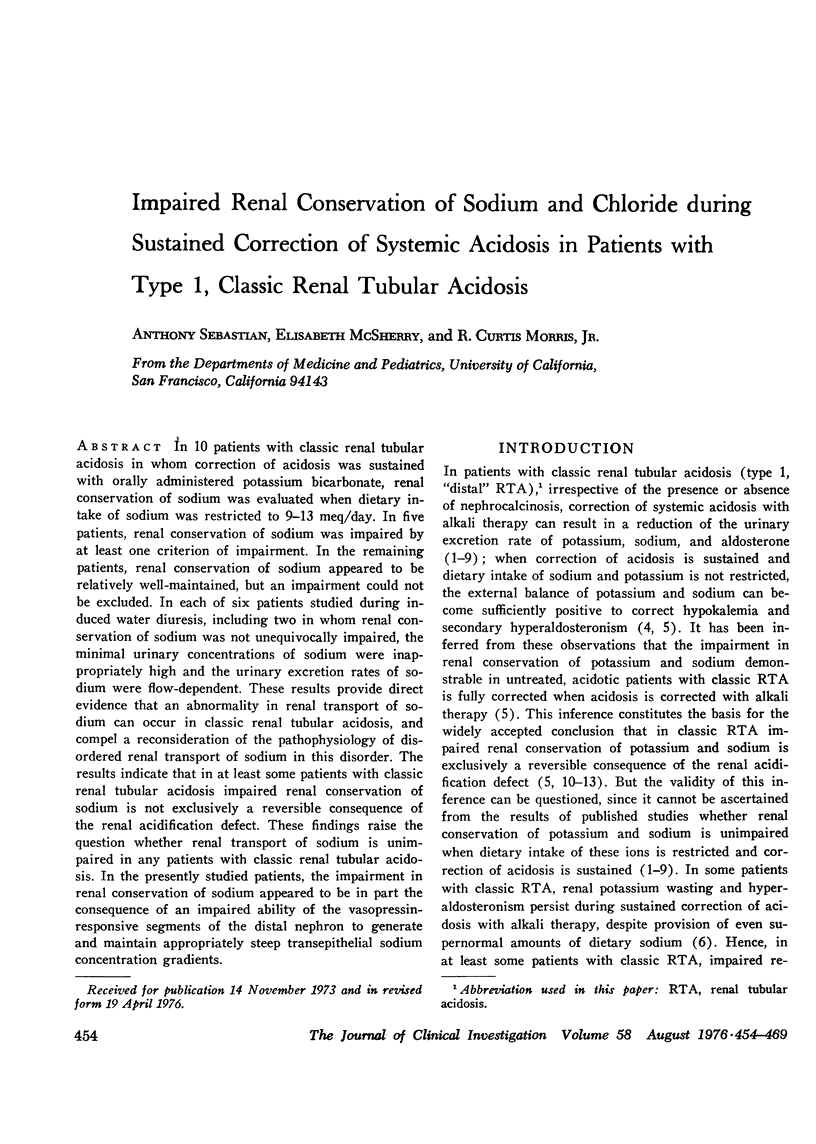
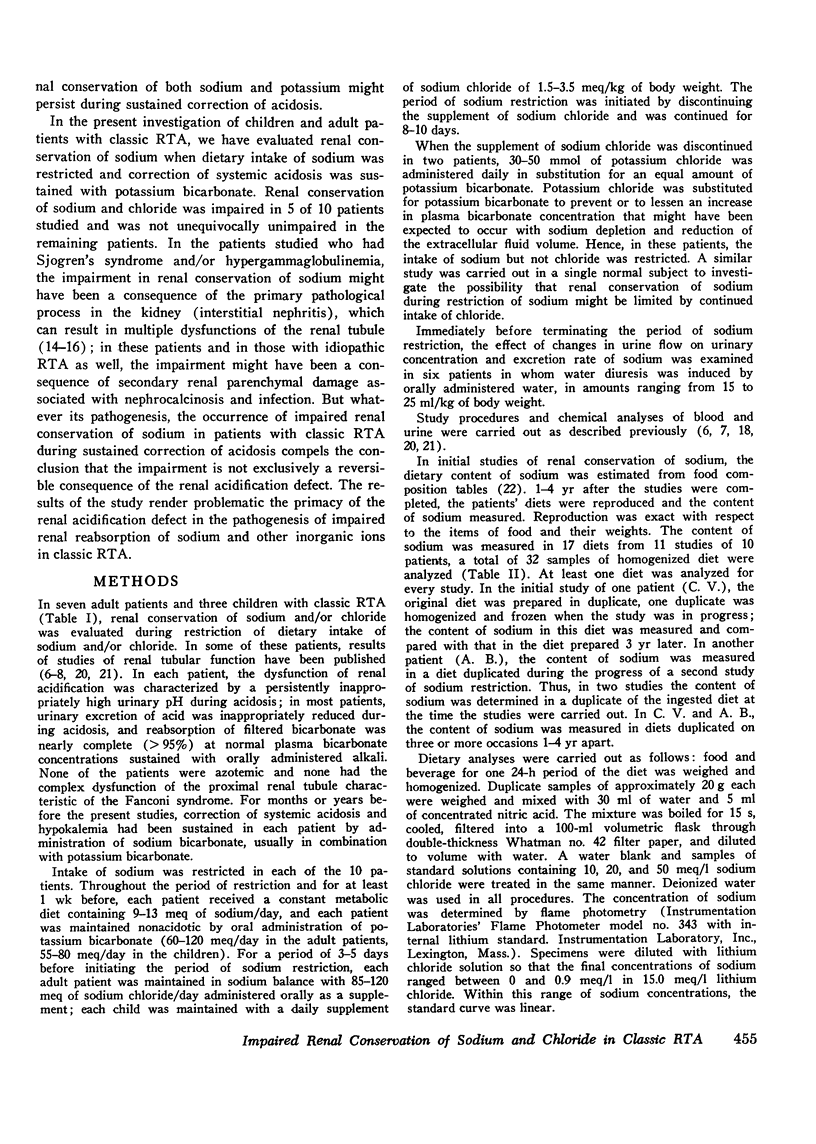
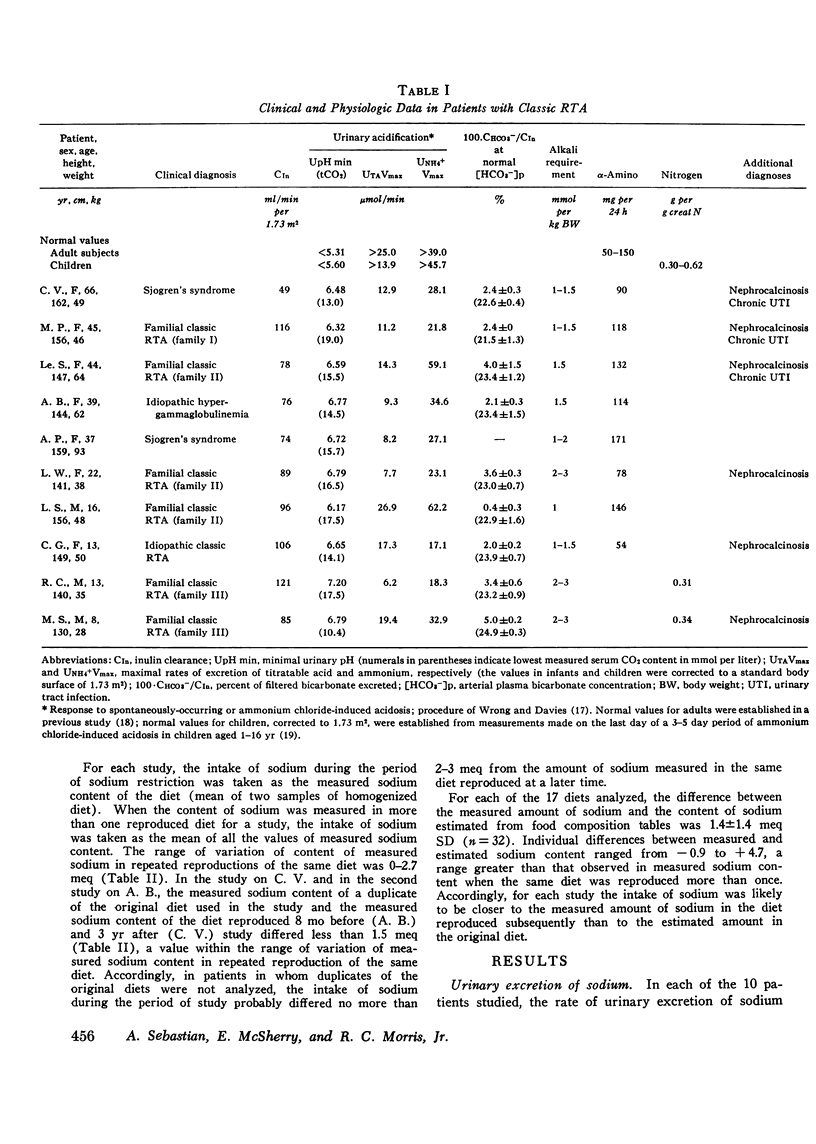
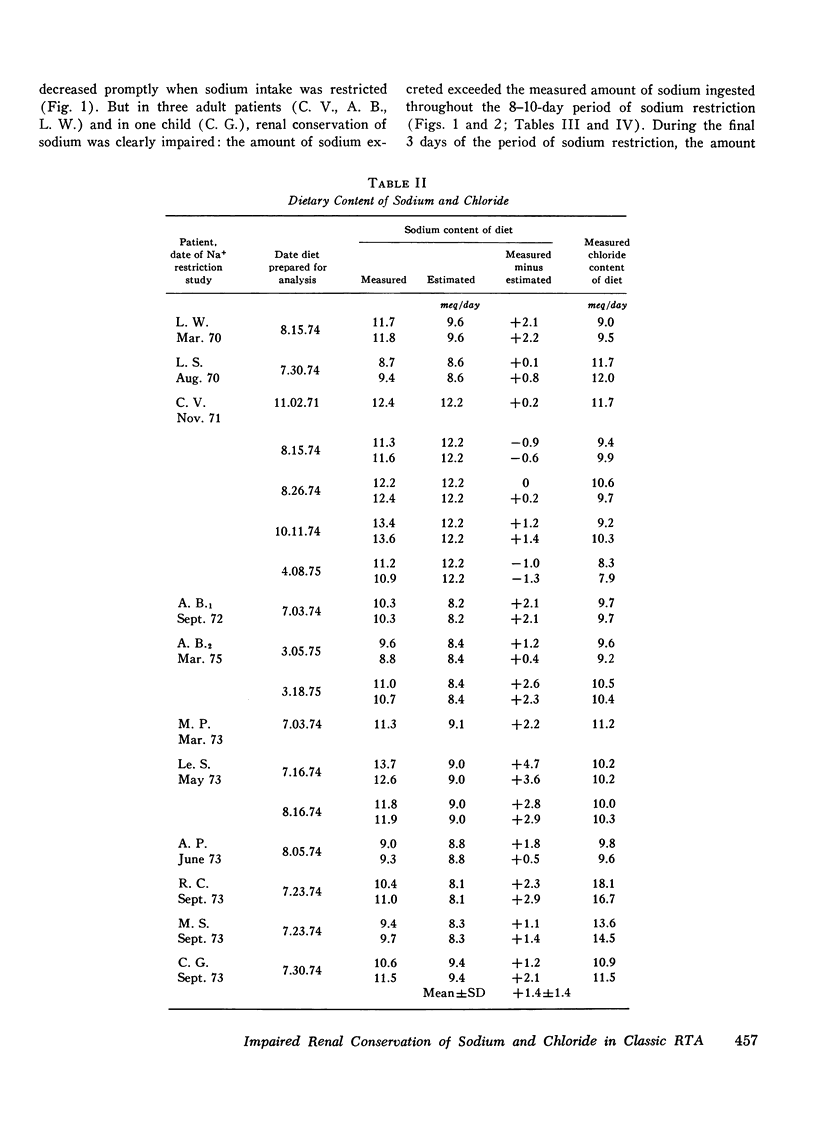
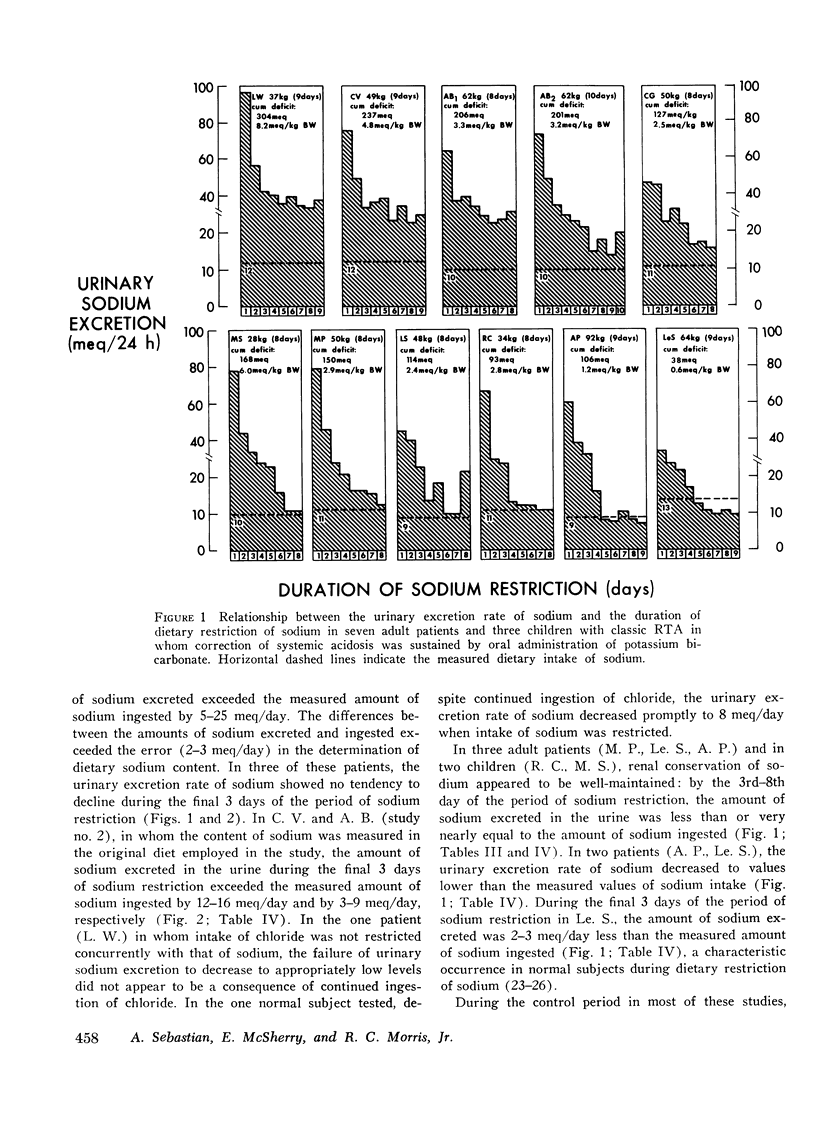
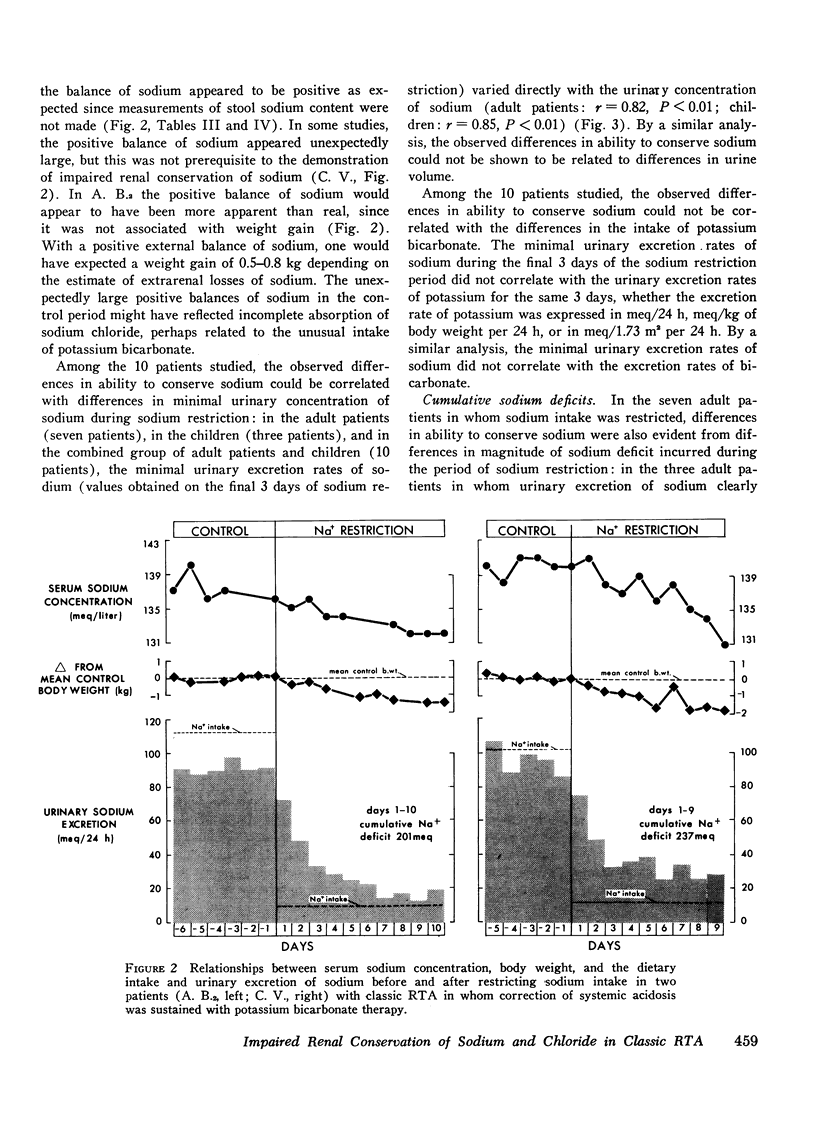
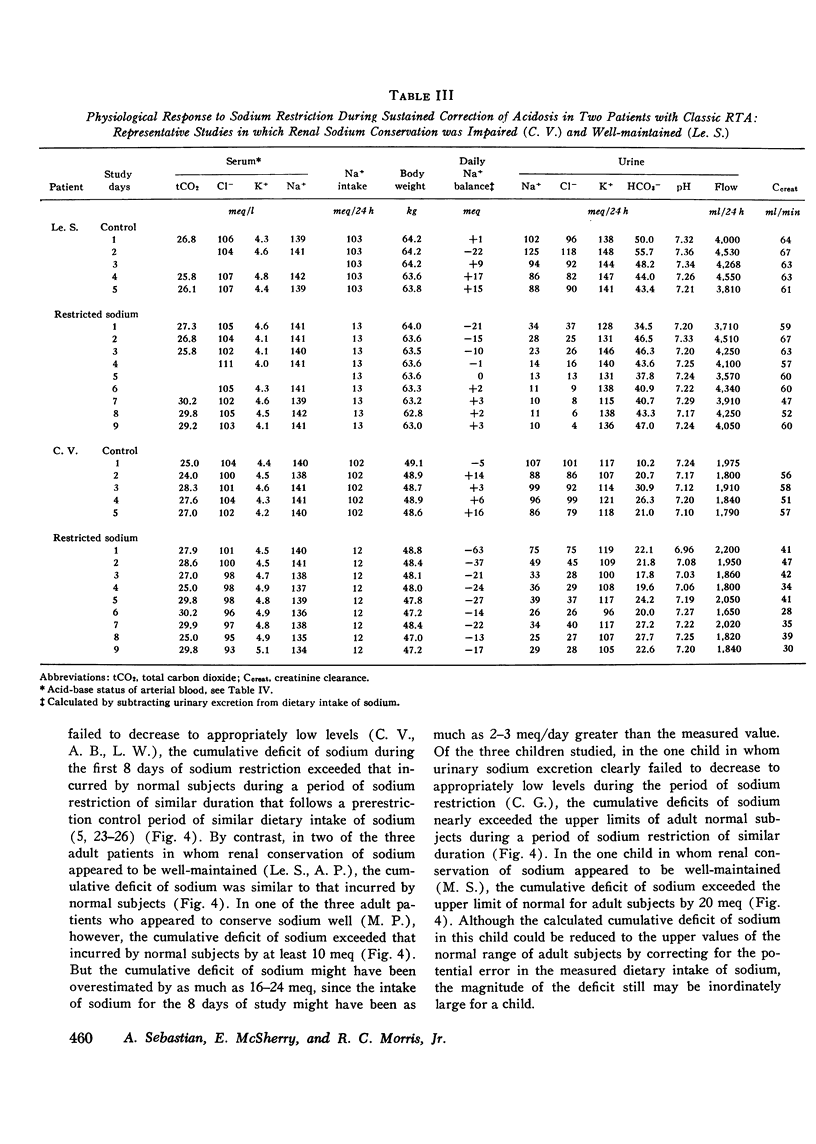
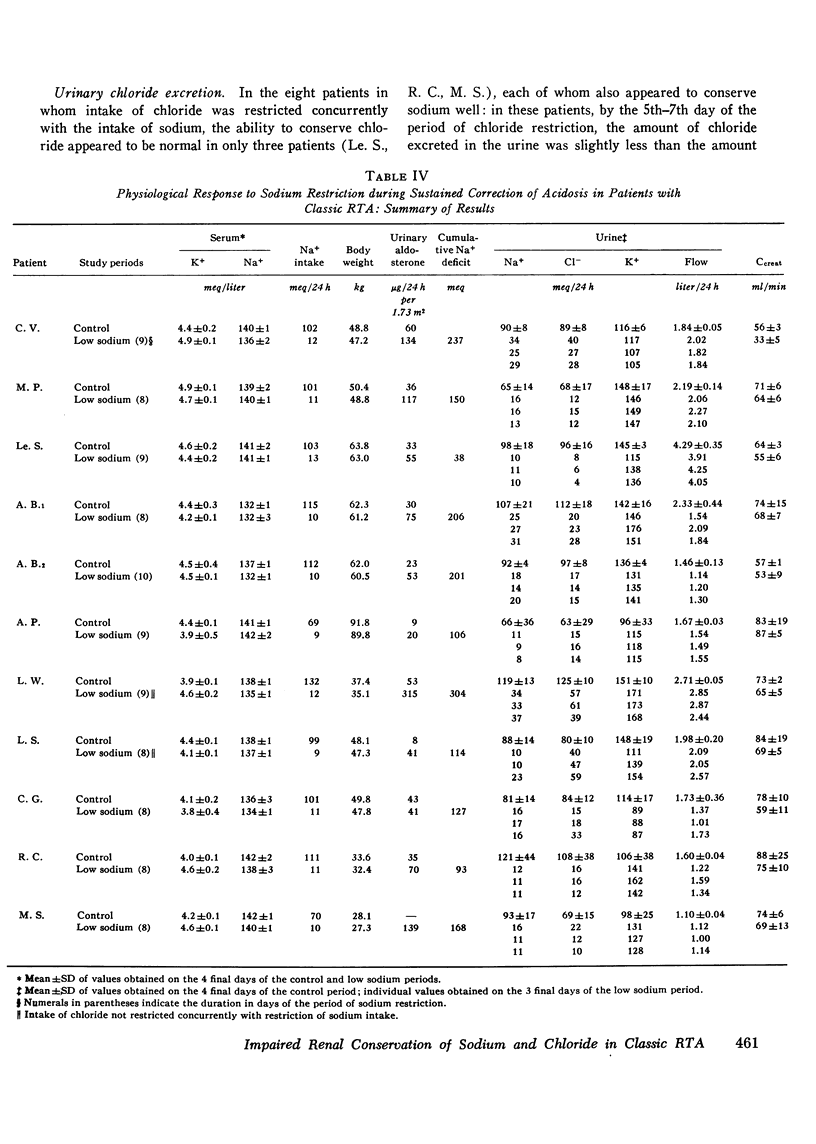
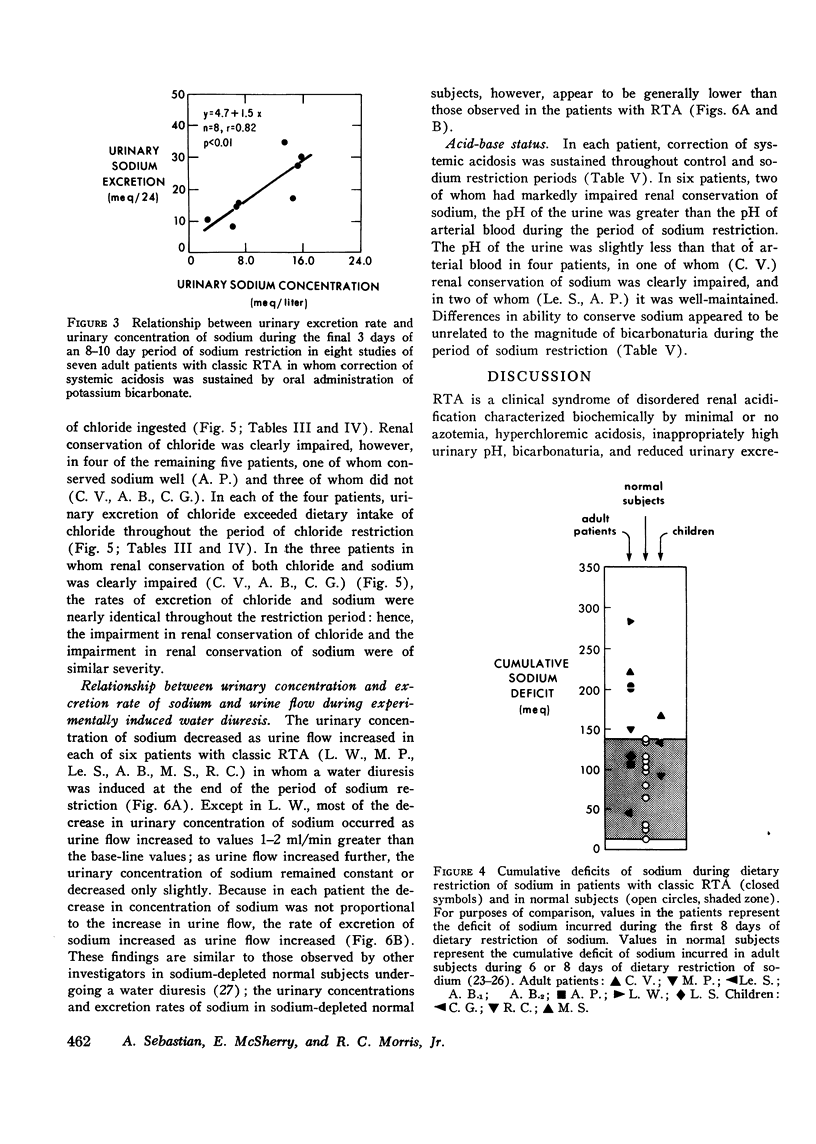
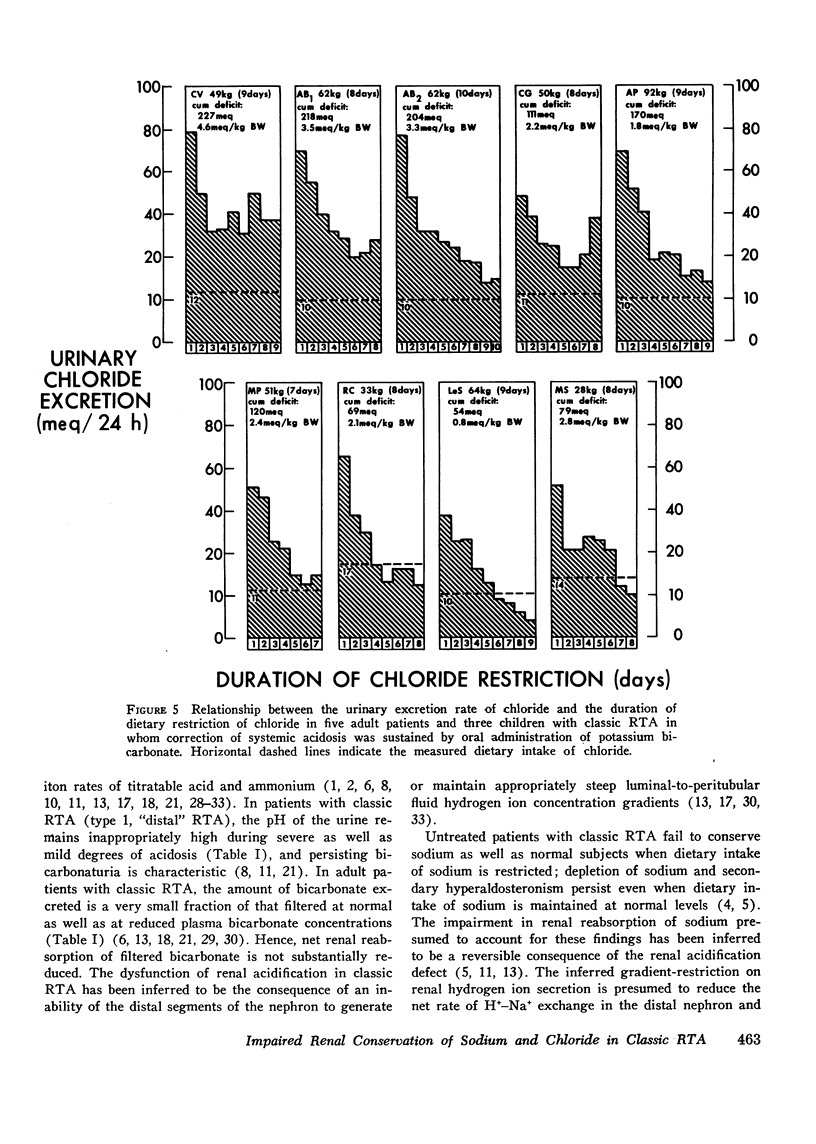
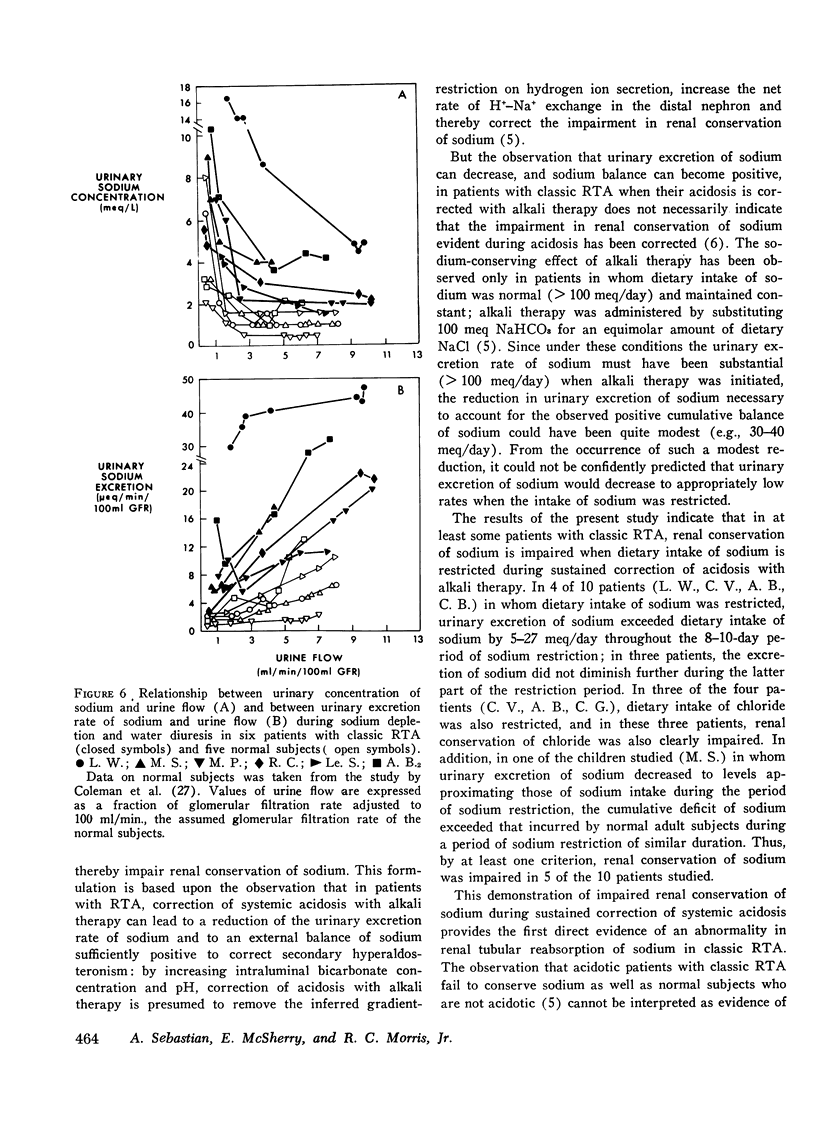
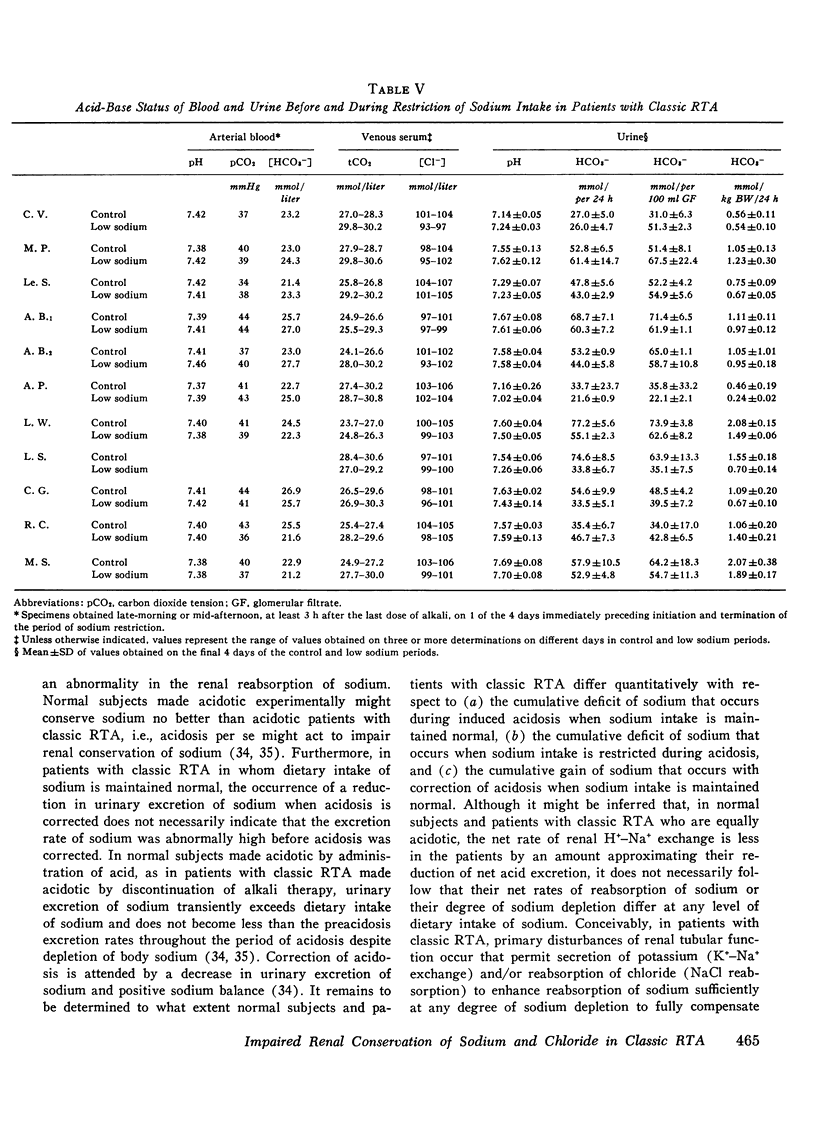
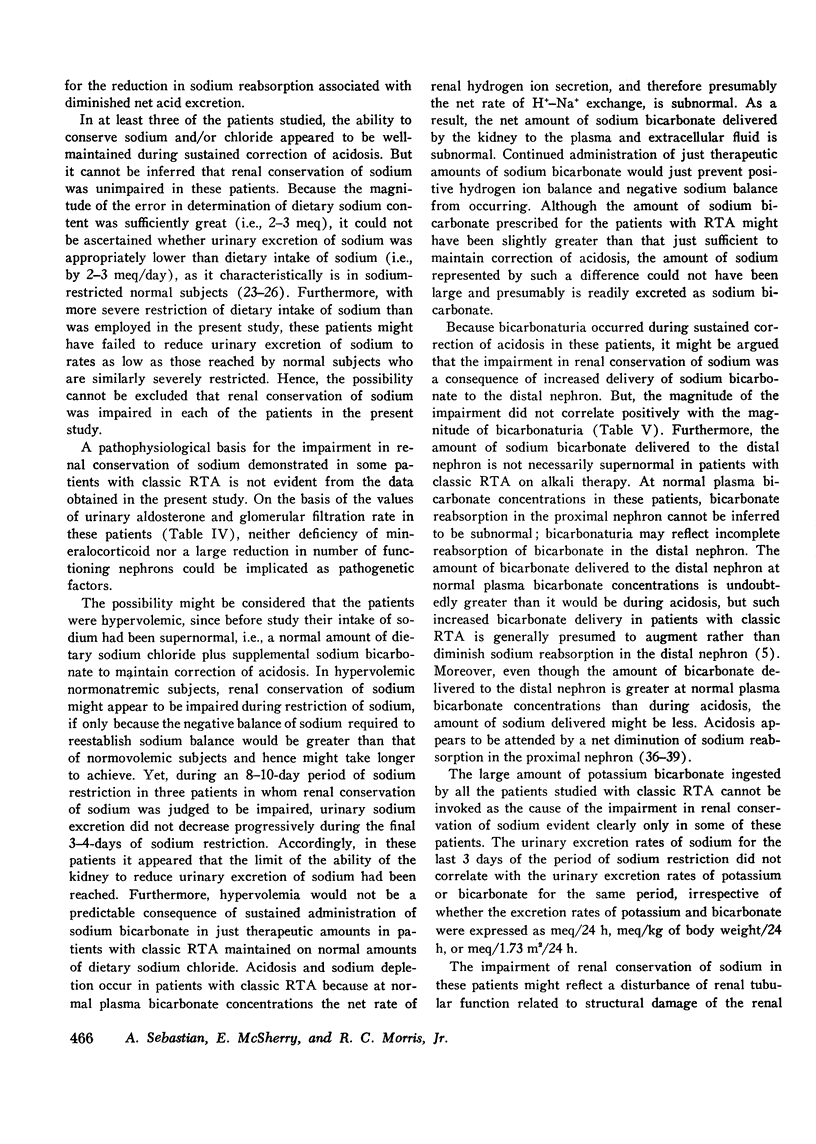
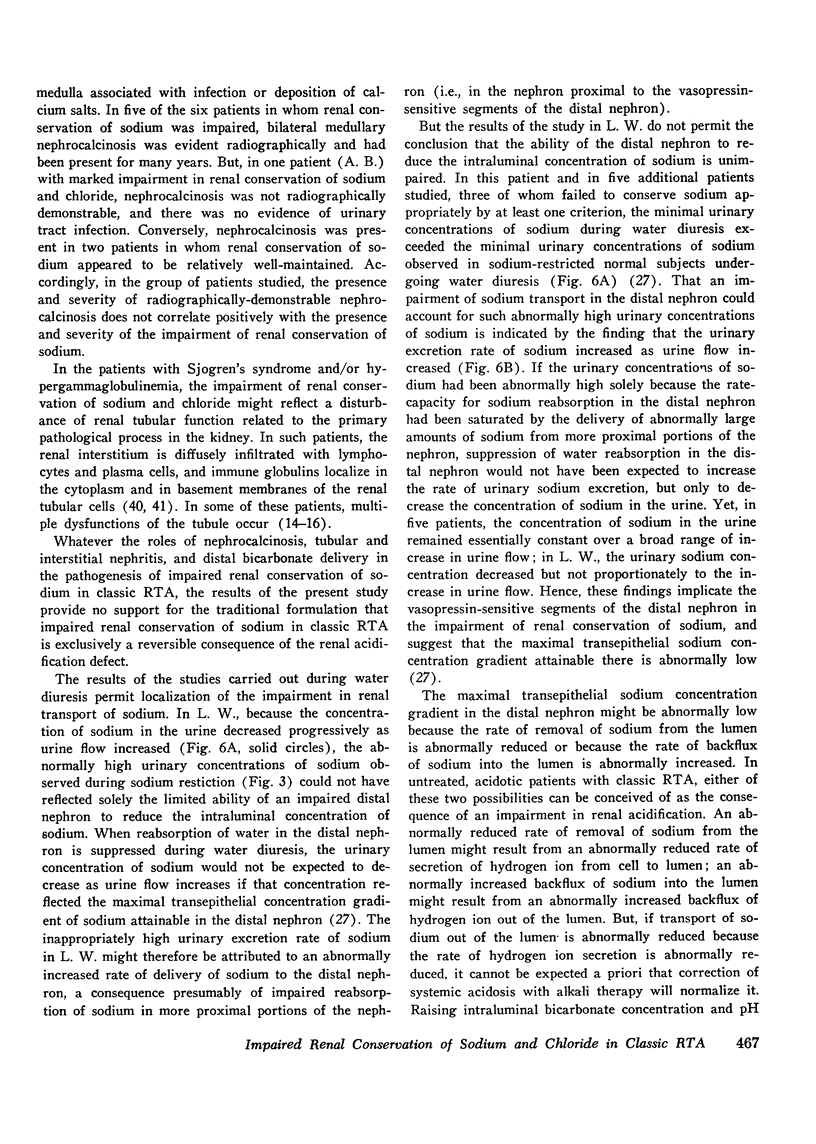
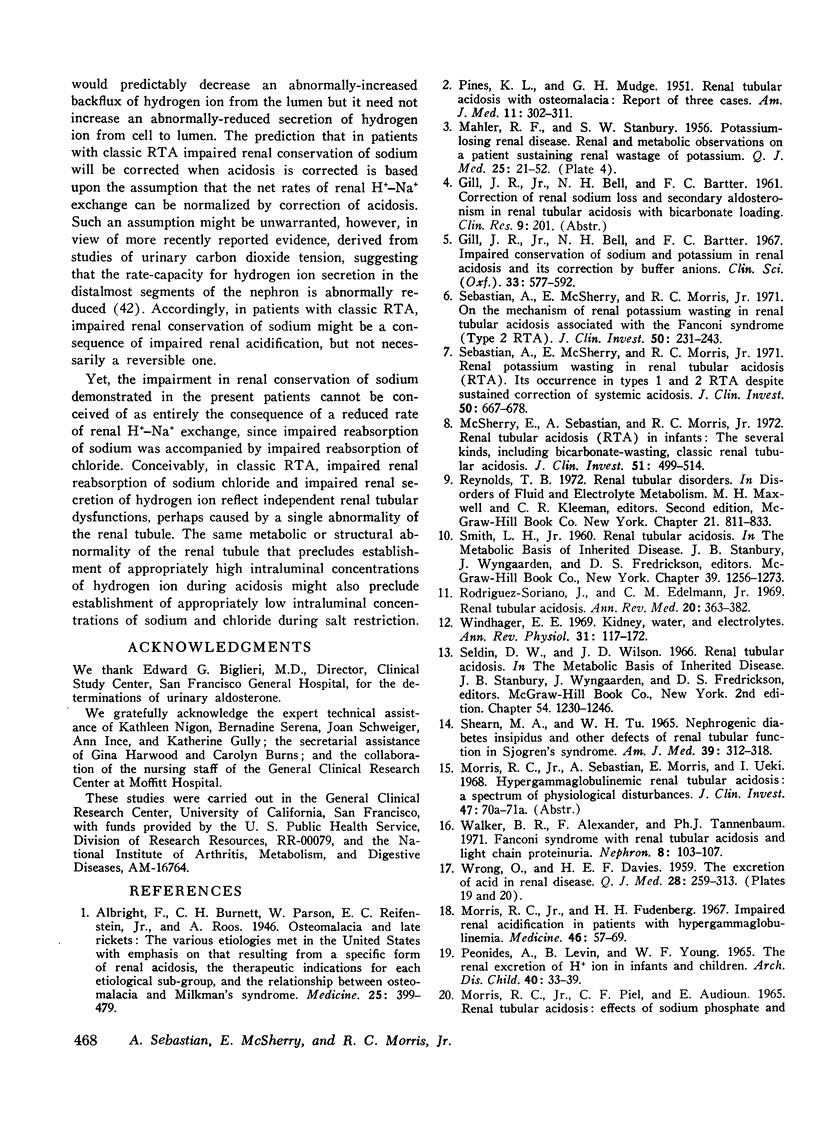
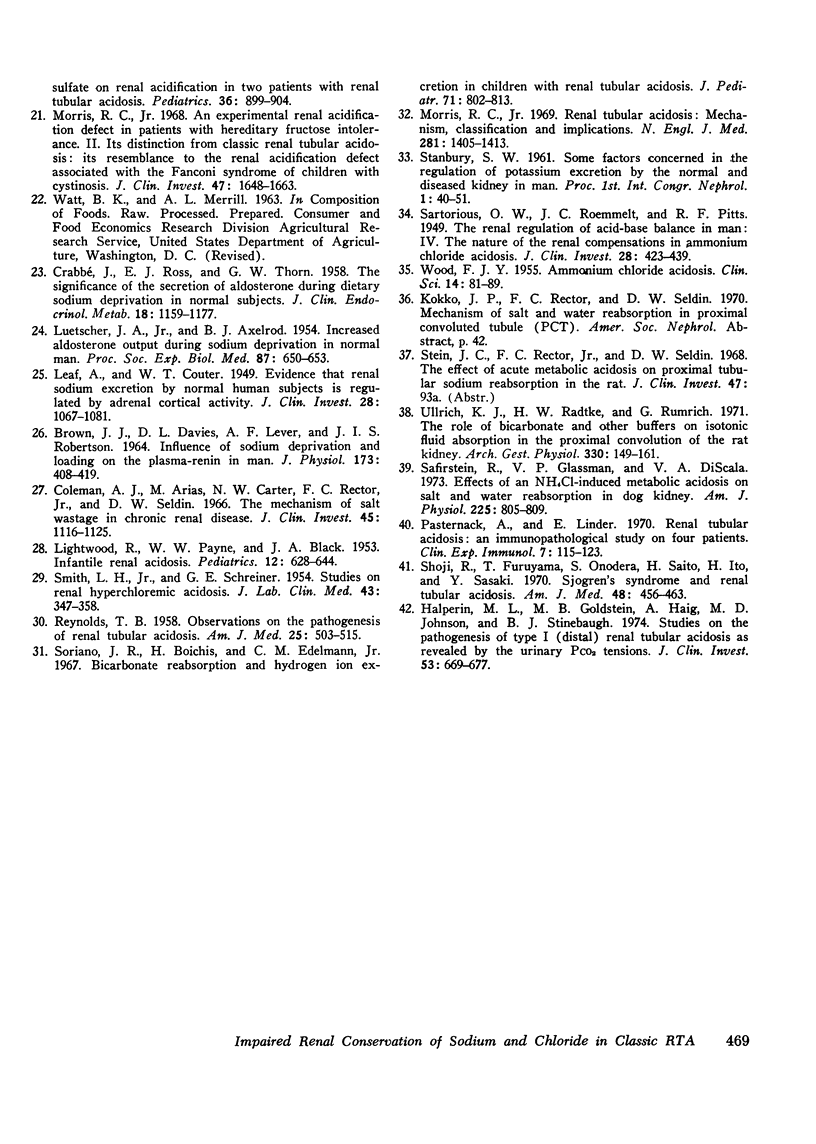
Selected References
These references are in PubMed. This may not be the complete list of references from this article.
- BROWN J. J., DAVIES D. L., LEVER A. F., ROBERTSON J. I. INFLUENCE OF SODIUM DEPRIVATION AND LOADING ON THE PLASMA-RENIN IN MAN. J Physiol. 1964 Oct;173:408–419. doi: 10.1113/jphysiol.1964.sp007464. [DOI] [PMC free article] [PubMed] [Google Scholar]
- CRABBE J., ROSS E. J., THORN G. W. The significance of the secretion of aldosterone during dietary sodium deprivation in normal subjects. J Clin Endocrinol Metab. 1958 Nov;18(11):1159–1177. doi: 10.1210/jcem-18-11-1159. [DOI] [PubMed] [Google Scholar]
- Coleman A. J., Arias M., Carter N. W., Rector F. C., Seldin D. W. The mechanism of salt wastage in chronic renal disease. J Clin Invest. 1966 Jul;45(7):1116–1125. doi: 10.1172/JCI105418. [DOI] [PMC free article] [PubMed] [Google Scholar]
- Gill J. R., Jr, Bell N. H., Bartter F. C. Impaired conservation of sodium and potassium in renal tubular acidosis and its correction by buffer anions. Clin Sci. 1967 Dec;33(3):577–592. [PubMed] [Google Scholar]
- Halperin M. L., Goldstein M. B., Haig A., Johnson M. D., Stinebaugh B. J. Studies on the pathogenesis of type I (distal) renal tubular acidosis as revealed by the urinary PCO2 tensions. J Clin Invest. 1974 Mar;53(3):669–677. doi: 10.1172/JCI107604. [DOI] [PMC free article] [PubMed] [Google Scholar]
- LIGHTWOOD R., PAYNE W. W., BLACK J. A. Infantile renal acidosis. Pediatrics. 1953 Dec;12(6):628–644. [PubMed] [Google Scholar]
- LUETSCHER J. A., Jr, AXELRAD B. J. Increased aldosterone output during sodium deprivation in normal men. Proc Soc Exp Biol Med. 1954 Dec;87(3):650–653. doi: 10.3181/00379727-87-21472. [DOI] [PubMed] [Google Scholar]
- Leaf A., Couter W. T., Lutchansky M., Reimer A. EVIDENCE THAT RENAL SODIUM EXCRETION BY NORMAL HUMAN SUBJECTS IS REGULATED BY ADRENAL CORTICAL ACTIVITY. J Clin Invest. 1949 Sep;28(5 Pt 2):1067–1081. doi: 10.1172/JCI102139. [DOI] [PMC free article] [PubMed] [Google Scholar]
- MAHLER R. F., STANBURY S. W. Potassium-losing renal disease; renal and metabolic observations on a patient sustaining renal wastage of potassium. Q J Med. 1956 Jan;25(97):21–52. [PubMed] [Google Scholar]
- McSherry E., Sebastian A., Morris R. C., Jr Renal tubular acidosis in infants: the several kinds, including bicarbonate-wasting, classic renal tubular acidosis. J Clin Invest. 1972 Mar;51(3):499–514. doi: 10.1172/JCI106838. [DOI] [PMC free article] [PubMed] [Google Scholar]
- Morris R. C., Jr An experimental renal acidification defect in patients with hereditary fructose intolerance. II. Its distinction from classic renal tubular acidosis; its resemblance to the renal acidification defect associated with the Fanconi syndrome of children with cystinosis. J Clin Invest. 1968 Jul;47(7):1648–1663. doi: 10.1172/JCI105856. [DOI] [PMC free article] [PubMed] [Google Scholar]
- Morris R. C., Jr, Fudenberg H. H. Impaired renal acidification in patients with hypergammaglobulinemia. Medicine (Baltimore) 1967 Jan;46(1):57–69. doi: 10.1097/00005792-196701000-00003. [DOI] [PubMed] [Google Scholar]
- Morris R. C., Jr Renal tubular acidosis. Mechanisms, classification and implications. N Engl J Med. 1969 Dec 18;281(25):1405–1413. doi: 10.1056/NEJM196912182812508. [DOI] [PubMed] [Google Scholar]
- Morris R. C., Piel C. F., Audioun E. Renal tubular acidosis. Effects of sodium phosphate and sulfate on renal acidification in two patients with renal tubular acidosis. Pediatrics. 1965 Dec;36(6):899–904. [PubMed] [Google Scholar]
- PEONIDES A., LEVIN B., YOUNG W. F. THE RENAL EXCRETION OF HYDROGEN IONS IN INFANTS AND CHILDREN. Arch Dis Child. 1965 Feb;40:33–39. doi: 10.1136/adc.40.209.33. [DOI] [PMC free article] [PubMed] [Google Scholar]
- PINES K. L., MUDGE G. H. Renal tubular acidosis with osteomalacia; report of 3 cases. Am J Med. 1951 Sep;11(3):302–311. doi: 10.1016/0002-9343(51)90167-2. [DOI] [PubMed] [Google Scholar]
- Pasternack A., Linder E. Renal tubular acidosis: an immunopathological study on four patients. Clin Exp Immunol. 1970 Jul;7(1):115–123. [PMC free article] [PubMed] [Google Scholar]
- REYNOLDS T. B. Observations on the pathogenesis of renal tubular acidosis. Am J Med. 1958 Oct;25(4):503–515. doi: 10.1016/0002-9343(58)90040-8. [DOI] [PubMed] [Google Scholar]
- Rodriguez-Soriano J., Edelmann C. M., Jr Renal tubular acidosis. Annu Rev Med. 1969;20:363–382. doi: 10.1146/annurev.me.20.020169.002051. [DOI] [PubMed] [Google Scholar]
- SHEARN M. A., TU W. H. NEPHROGENIC DIABETIC INSIPIDUS AND OTHER DEFECTS OF RENAL TUBULAR FUNCTION IN SJOERGREN'S SYNDROME. Am J Med. 1965 Aug;39:312–318. doi: 10.1016/0002-9343(65)90057-4. [DOI] [PubMed] [Google Scholar]
- SMITH L. H., Jr, SCHREINER G. E. Studies on renal hyperchloremic acidosis. J Lab Clin Med. 1954 Mar;43(3):347–358. [PubMed] [Google Scholar]
- Safirstein R., Glassman V. P., DiScala V. A. Effects of an NH4Cl-induced metabolic acidosis on salt and water reabsorption in dog kidney. Am J Physiol. 1973 Oct;225(4):805–809. doi: 10.1152/ajplegacy.1973.225.4.805. [DOI] [PubMed] [Google Scholar]
- Sartorius O. W., Roemmelt J. C., Pitts R. F., Calhoon D., Miner P. THE RENAL REGULATION OF ACID-BASE BALANCE IN MAN. IV. THE NATURE OF THE RENAL COMPENSATIONS IN AMMONIUM CHLORIDE ACIDOSIS. J Clin Invest. 1949 May;28(3):423–439. doi: 10.1172/JCI102087. [DOI] [PMC free article] [PubMed] [Google Scholar]
- Sebastian A., McSherry E., Morris R. C., Jr On the mechanism of renal potassium wasting in renal tubular acidosis associated with the Fanconi syndrome (type 2 RTA). J Clin Invest. 1971 Jan;50(1):231–243. doi: 10.1172/JCI106479. [DOI] [PMC free article] [PubMed] [Google Scholar]
- Sebastian A., McSherry E., Morris R. C., Jr Renal potassium wasting in renal tubular acidosis (RTA): its occurrence in types 1 and 2 RTA despite sustained correction of systemic acidosis. J Clin Invest. 1971 Mar;50(3):667–678. doi: 10.1172/JCI106537. [DOI] [PMC free article] [PubMed] [Google Scholar]
- Shioji R., Furuyama T., Onodera S., Saito H., Ito H., Sasaki Y. Sjögren's syndrome and renal tubular acidosis. Am J Med. 1970 Apr;48(4):456–463. doi: 10.1016/0002-9343(70)90045-8. [DOI] [PubMed] [Google Scholar]
- Soriano J. R., Boichis H., Edelmann C. M., Jr Bicarbonate reabsorption and hydrogen ion excretion in children with renal tubular acidosis. J Pediatr. 1967 Dec;71(6):802–813. doi: 10.1016/s0022-3476(67)80005-2. [DOI] [PubMed] [Google Scholar]
- Ullrich K. J., Radtke H. W., Rumrich G. The role of bicarbonate and other buffers on isotonic fluid absorption in the proximal convolution of the rat kidney. Pflugers Arch. 1971;330(2):149–161. doi: 10.1007/BF00643031. [DOI] [PubMed] [Google Scholar]
- WOOD F. J. Ammonium chloride acidosis. Clin Sci. 1955 Feb;14(1):81–89. [PubMed] [Google Scholar]
- WRONG O., DAVIES H. E. The excretion of acid in renal disease. Q J Med. 1959 Apr;28(110):259–313. [PubMed] [Google Scholar]
- Walker B. R., Alexander F., Tannenbaum P. J. Fanconi syndrome with renal tubular acidosis and light chain proteinuria. Nephron. 1971;8(1):103–107. doi: 10.1159/000179912. [DOI] [PubMed] [Google Scholar]
- Windhager E. E. Kidney, water, and electrolytes. Annu Rev Physiol. 1969;31:117–172. doi: 10.1146/annurev.ph.31.030169.001001. [DOI] [PubMed] [Google Scholar]


